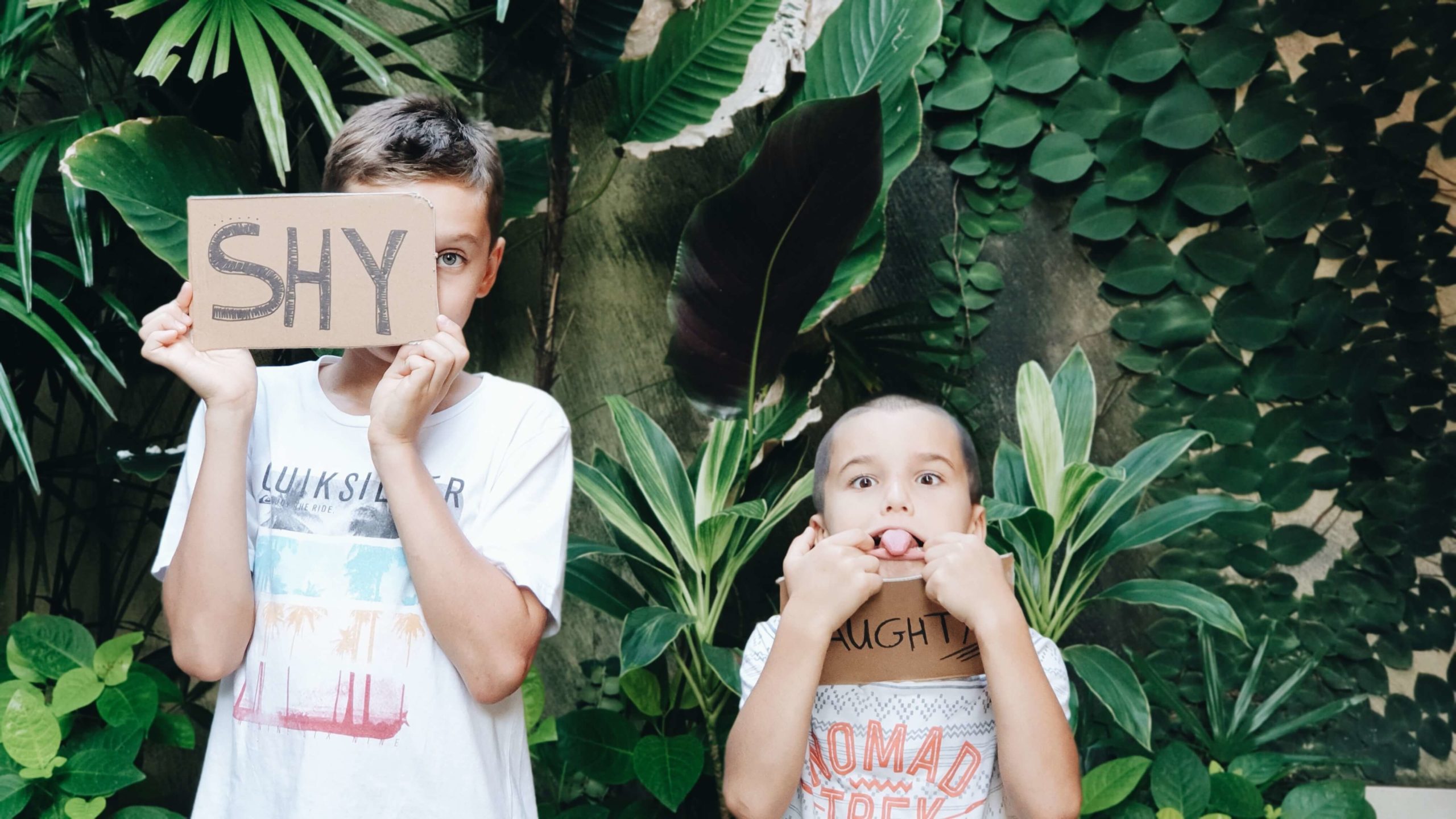
#10 Do You Label Your Children? Hurry To Find An Easy Way Out
You don’t have time right now? Download the PDF of this blog post and come back to it later!
What’s a label
When you think of someone in a certain way, or if you keep speaking to this person about something in particular, it’s going to stick. The person ends up thinking of herself through that image you sent her over and over. When obviously she is much more than that. And the worse? We do it all the time.
To categorize comes naturally to us. Since we were young children our brain has been working hard to understand and categorize the world. It takes some work to recognize that apples are apples, no matter their size or color or that everything with four feet and a flat surface is a table. But what is great for things isn’t that good for human beings.
If I were to meet you and ask you about your husband, you could label him in no time. For mine, I would say that he’s an outdoor guy, quiet and thoughtful, with a grumpy tendency. Now you have an image of my husband. A reducing image that is.
The problem with labels is that we lose so much of a person on the way. We are all more than a couple of traits of characters. The risk is, after hearing something about oneself for years, we might end up acting according to this label(s). If i keep telling my husband that he is a grumpy guy, every time he feels in a bad mood he will think “that’s right, I’m a grumpy guy”, and here goes any attempt at changing is mood.
[Tweet “#Labels we give people reinforce their behaviors.”]What about you?
Can you think of something you were told all the time as a child?
For example, I was always told that I was loud: « you speak too loud! », « we can only hear you! », « speak more quietly! ». With those words came the attitudes: people putting fingers in their ears, faces expressing pain,…
What are the results of this constant reminder of what people saw as a flaw in me?
I always focus on speaking quietly when in a group with the consequence that I am less spontaneous and I am much more discreet that my true nature. Sometimes I even lose the comfort of being part of a group because I hate having to erase myself all the time. But the belief is here, if I am being too loud, people won’t like me.
What about you? What were you told as a child? And thinking of the present, does it impact your behavior?You can write down on a piece of paper or a little notebook the flaw(s) you were told as a child and the consequences in your present.
Now, let’s do an exercise to overcome that.
I want you to write 20 other labels about yourself. Make them positive. Take your time.
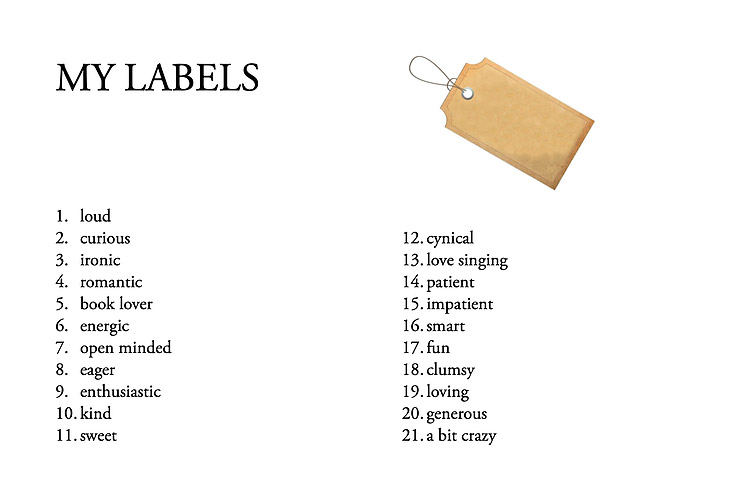
Can you see how your « flaw » is lost in the number? We are not one label, or two, we are full of rich characteristics that make who we are.
I would like you to do the same for your child(ren). Write their name on a paper and under it, write the label you give them most often (or that he is given most often). And then write 20 other labels about him/her. Take the time you need, make yourself a tea, but write down all twenty of them. Look at your list. Can you see how less important is that characteristic that bothers you or others sometimes?
If your child is going to school and the teachers are labeling him, ask the same of the teachers. Tell them that you don’t agree with them labeling your child and you would like them to give you 20 other characteristics about him. (Tip: it works for mothers-in-law, neighbors or anybody who has something to say about your child).
When we label a child, we give him an identity he didn’t choose. He might become captive of it. He will think of himself as « clumsy », « loud », « shy », « impatient »,…
It is our job as parents to help our children to grow into a healthy, balanced grown-up who will have good self-esteem and confidence.
And here is a secret I share with you today: it is easy to achieve when it comes to labels!
We will talk about the healthy, balanced and confident in another post, today we will focus on self-esteem because this is where labels create damages.
 photo created by prostooleh – freepik.com
photo created by prostooleh – freepik.com
The 4 pillars of self-esteem
They are four pillars that have a direct influence on our self-esteem:
-
Physical appearance
-
Results (What am I capable of? What am I good at?)
-
Quality of the relations with the family
-
Quality of the relations with peers
When talking about labels, know they can create damages for any of those pillars.
1. Physical appearance
« You’re fat/small/big », « you look like a witch » (I say that to my daughter when she hasn’t brushed her hair), « you’re always dirty »,…
If a child hears that he is fat/small/big/dirty/dressed with bad taste/…, during his all childhood, he will identify to that. He will try to hide this flaw by shrinking, developing eating disorders or excessive shyness.
2. Results
« You’re dumb », « you’re a loser », « you’ll never make it », « stop trying », « you don’t do your best », « you don’t have the family brains/talents », « you’re slow »,…
Your child(ren) will identify himself after those characteristics. There he might take one of two courses: becoming a results maniac to prove people wrong or giving up on trying.
3. Quality of the relations with the family
« You want all the attention », « he’s always the clown », « why don’t you speak more? », « why don’t you play with your cousins? ».
In families, we have values and traditions. Some families are big and loud. A quiet child will be seen as antisocial, an excited one as a funny kid. Some families are quiet by nature, and then the look on a child will be reversed. But we don’t choose where we are born (some would say we do but it’s not a reason to not be welcome, is it?).
4. Quality of the relations with peers
« Why you don’t have more friends? », « you’re always into fights », « you choose the worst friends », « that your girlfriend?! ».
We are not with our children when they are with their peers, at least, we shouldn’t be. This is their private circle, their secret garden. Who are we to judge that? How can we know which of those friends will be loyal when the need comes? Maybe not the one we foresaw…
Your value doesn’t decrease based on someone’s ability to see your worth. Anonymous
It is important to have a balance between those 4 pillars. Nobody can be the best at everything, and it’s fine. It’s all about teaching your child that when they have a lack somewhere, there is an up somewhere else. Maybe they are not good at maths? But they have easy relations with peers. Maybe they’re smaller than others, but they are great piano players,… It is you who can teach them not to be hurt by others’ opinions but rather believe in their own value.
Identity and acts
We often hurt a child’s esteem when we are angry. When you tell your child « you’re useless! » (which is a terrible example, never say that!), it’s a blow to his self-worth. If your child is useless, it means that you didn’t teach him properly, or in a way he can’t understand. When you say that, you hurt his will to try again, to persist and succeed. But if a child is not able, it is your responsibility as a parent, not his. You’re the one supposed to teach him, aren’t you?
A parent should NEVER, NEVER, attack his child’s identity. You are allowed to be angry, pissed, bored, exhausted, in a bad moon, menstruated, stressed, anxious, at the end of your rope, you DON’T attack his identity. You might still not be nice all the time, it’s ok, I’m the most volcanic mother I know and my kids are very used to my outbursts. But if I have to lose it on something, I will go for facts, not for the person. Examples?
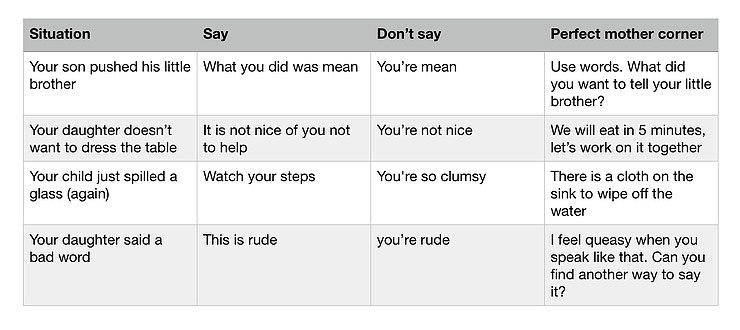
Beyond each behavior, a need
Another way to accept behaviors that get on our nerves is to understand that children don’t “act”, “overact” or try to manipulate us. They have needs, just like us, and like every human, their main goal in life is to satisfy their needs.
So what with labels? Labels are a convenient way to give an easy explanation to behaviors we don’t accept or understand. If you say that your son is “terrible”, that will explain for a lot of things. The problem is that nobody’s terrible, and beyond behaviors are needs we need to understand.
Helping children with their needs is a part of our job as a parent. Not the easiest one, I’ll have to agree. But a very educative one as you will learn so much about your children in the process.
First, let’s look at this behavior vs needs situation.
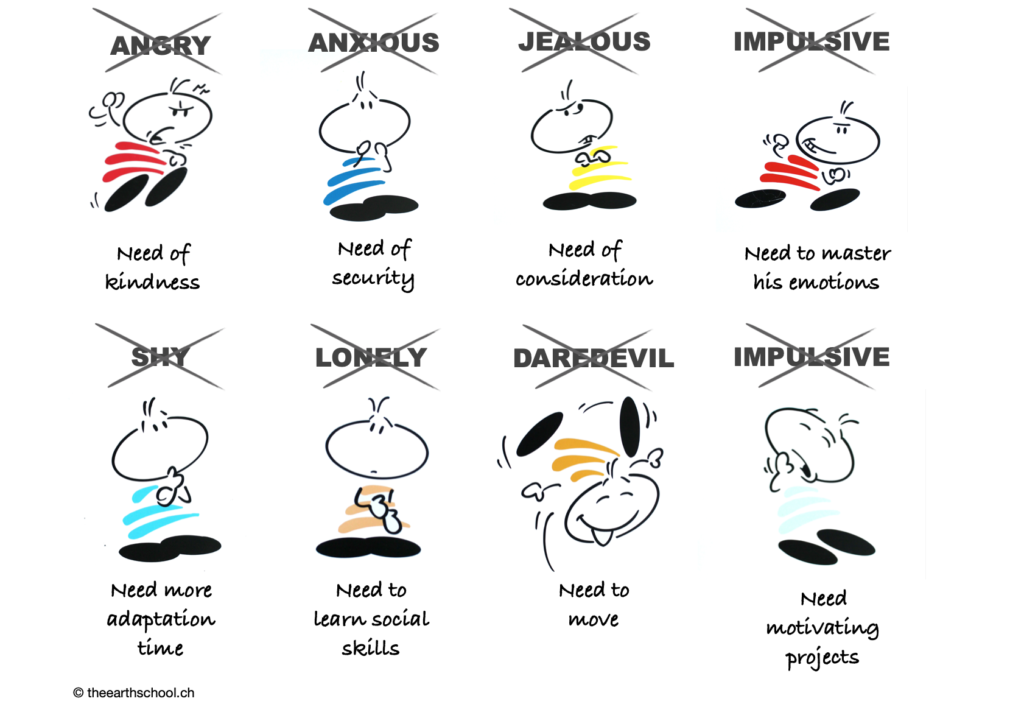
You can see where this is going now, can’t you? When your children are driving you crazy or get you worried, try to understand what’s the need behind the behavior.

Let’s take ANGER as an example. Some kids are labeled “angry kids”, they have a quick temper and get angry easily. One might consider that this is just a trait of character, a flaw, with which one has to live. It is true that we all have some traits that are more visible than others, but as we saw earlier, we are more than one characteristic.
Let’s get back to that child who gets easily angry:
Anger is a double process. We are angry at the other but also at us. I could be angry at someone for lying to me, but unconsciously I’ll also be angry at myself for being lied to. Do you see the process? Your child could be angry at you because he doesn’t want to eat carrots, but he will be also angry at himself. Maybe for being dependent on you, or for not being taken into account (you knew he didn’t like carrots), or for disappointing you by eating carrots.
It doesn’t really matter. The importance is the need behind the anger. And here it could be a need for consideration. If you look for the need and satisfy it, the anger will go, and your child will learn from you to express his needs (therefore he will be less and less angry as he learns to say what he needs instead of reacting when he doesn’t get it).
What have you learned?
You have learned that labels, positive or negative, are a jail for your child’s personality. I don’t think that anybody enjoys being only this or that. I know I don’t like my “loud” label, and I can think of some others that had an influence on my self-esteem. I’m supposed to suck at sport and to be a terrible singer. Truth is, with practice, I’ve become quite a good singer and I recently found out that I can do sport too! A natural talent or difficulty doesn’t mean anything as a child. We’ve seen sisters both playing the piano, one was a natural and not the other, but it’s the one who put efforts and consistency in her practice that became good in the end.
- When your child has a recurring behavior, first remember all his other features. You can do that on a piece of paper.
- When your child is really getting on your nerves, remember to condemn his acts, not his personality.
- Try and understand what’s the need behind the behavior.

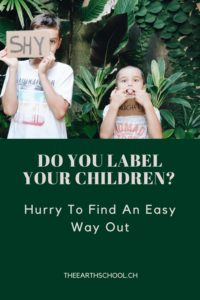 As always, I hope it gave you some line of thoughts to explore as well as ideas to act and create a positive change in your life and the life of your children.
As always, I hope it gave you some line of thoughts to explore as well as ideas to act and create a positive change in your life and the life of your children.
Don’t let the inspiration fades and take action right away:
- download our cheat-sheet, it’s on the house
- decide on the one action you will implement today and write it in your notebook
- share this article with 3 friends who could benefit from it
- save the article in your favorites

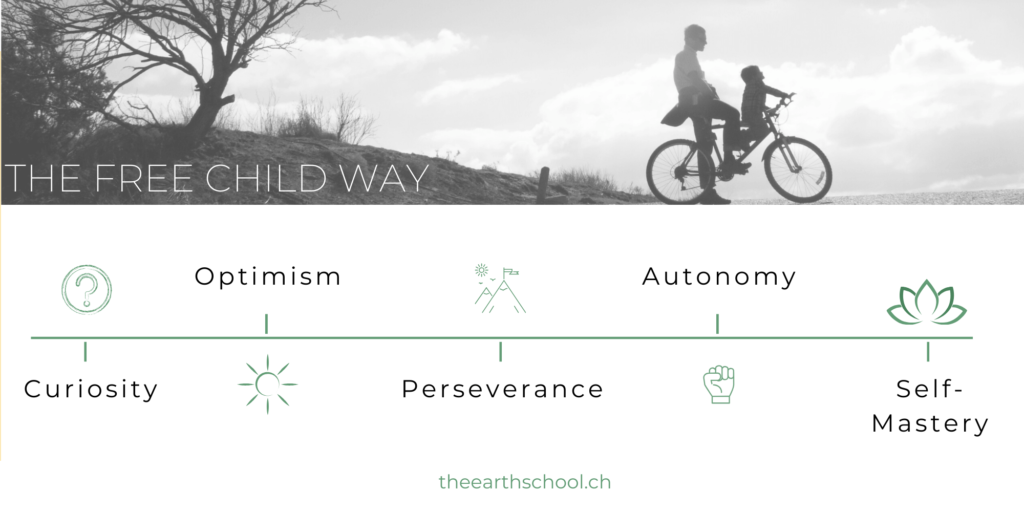
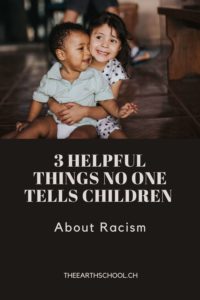


Don’t Forget To Join Our Community To Get Inspiration And Tips Straight in Your Mailbox
I wish you all the best with your kids. Always remember — we’re all doing the best we can in any given moment, so try not to judge yourself too harshly. Be confident and listen to your intuition. If what you do comes from a place of love, then you’re already on the right path.
If you want more resources, ⬇️ keep scrolling ⬇️
Looking for a way to set boundaries that feel fair for everyone? Here’s your home guide to healthy boundaries.
If your child is or is becoming a teenager, check out our parenting guide for teenagers!
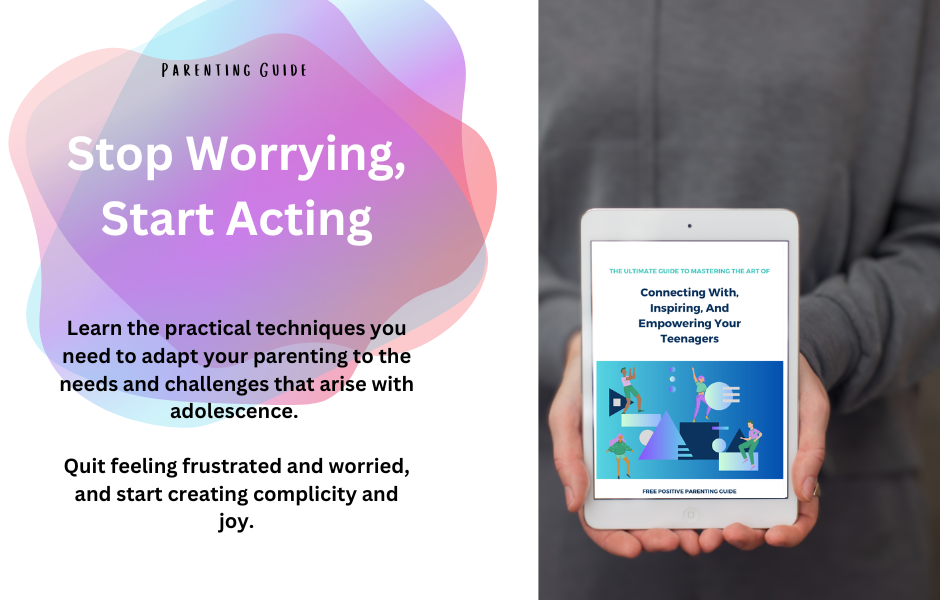


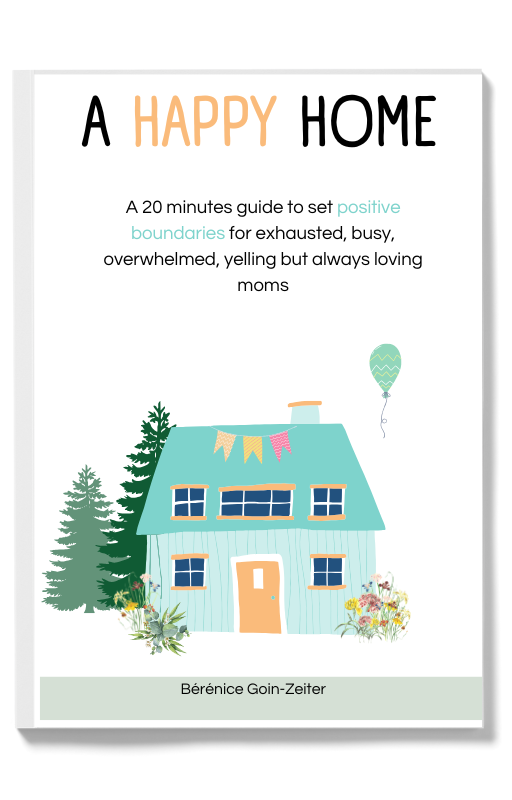

Permalink